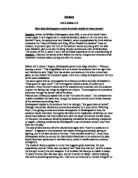‘ Hark, peace!
It was the owl that striek’d, the fatal bellman.
Which gives the stern’st good-night. He is about it.’
The sound of the owl is a simple but effective stage effect, creating tension. This is because the ‘owl shrieks’ symbolised the night watchman who would ring the bell outside the cells of prisoners condemned to death. A 16th century audience would have been recognised what Shakespeare meant, creating an image in people’s minds building up more suspense within the play. Lady Macbeth also says;
‘I heard the owl scream and the crickets cry’
Crickets were also believed by the Elizabethans to be the messenger of death, which is another effective stagecraft using imagery. I believe the mention of the owl also symbolises darkness, as the owl is a creature of the night, giving the scene a darker more chilling edge.
Macbeth cry’s out
‘Who’s there? What ho?’
This offstage noise leaves the audience thinking that Macbeth has been caught Shakespeare uses monosyllabic language in this quote to enhance the feelings of urgency and panic, which is a good use of language to create dramatic tension. Lady Macbeth does not immediately see her husband, this could be because of the imagery of darkness or maybe because Macbeth enters elsewhere. She hears his cry and doubts him; she thinks he has disturbed someone
‘Alack, I’m afraid they have awak’d’,
And ‘tis not done; th’attempt and not the deed
Confounds us. Hark! I laid their daggers ready,
He could not miss ‘em.’
There is urgency and panic in her speech and a sense of desperation, this creates dramatic tension for the audience as you can feel Lady Macbeth's worry.
Macbeth’s anxiety prevents him from going back to the scene of the murder
‘ I’ll go no more.
I am afraid to think what I have done;
Look on’t again, I dare not.
Lady Macbeth shows here frustration (anxiety) at Macbeth’s attitude and takes the daggers from Macbeth
’Infirm of purpose!
Give me the daggers. The sleeping and the dead
Are but pictures; ‘tis the eye of childhood
That fears a painted devil.’
It is obvious from this quote that Lady Macbeth is angry with Macbeth, she is in a rage, probably because she to struggling to stay in control of the situation and because the thought of them both being discovered scares her. She is however under the infuence of alcohol, so has courage’ That which hath made them drunk, hath made me bold;’ to take the daggers back. She views Macbeth as being week minded and childish.
This allows Shakespeare to take Lady Macbeth from the stage and create another stage effect leaving Macbeth to become even more hysterical. He is standing in the courtyard where anyone could catch him generating more tension. Then there is a knock at the gate, which makes the already jumpy Macbeth even worse;
‘Whence is that knocking?
‘How is’t with me, when every noise appals me?’
The knocking gives the audience reader a feeling that the discovery of the murder is only being delayed by Macbeth's anxious talk.
‘What hands are here? Ha: they pluck out mine eyes.
Will all great neptune’s ocean wash this blood Clean from my hand?
No: this my hand will rather
The multitudinous seas incarnadine,
Making the green one red’.
In this quote Shakespeare applies the imagery blood. This has connotations of treason, guilt, murder and death. Macbeth wants to cleanse his hands from the blood to rid him of any evidence connecting him to the murder and perhaps clear his troubled mind. Also the punctuation Shakespeare uses makes Macbeth seem even more troubled as he talks to him self. The use of colons makes it seem as if Macbeth is having an argument within himself almost verging on schizophrenia.
Shakespeare’s use of language and structure manages to create tension throughout this act. He manages to gradually build up stage effects and language little by little, increasing the use of monosyllabic language and imagery taking the reader/audience on a roller coaster of emotions. His use of language and effects in the right places helps the characters and the play to become really believable. I believe this scene is designed with the sole intention of creating tension and to make the reader/audience believe the Macbeth will be caught, creating dramatic tension for the acts which follow.








